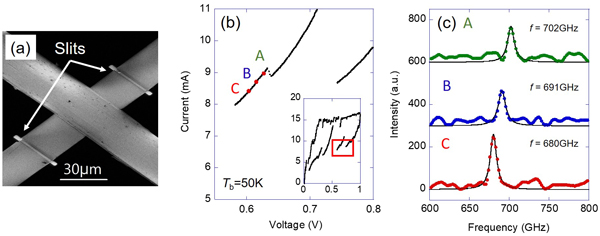PC6-5
THz emission from BSCCO cross-whisker junctions
Dec.2 16:30-16:45 (Tokyo Time)
NIMS1
Univ. of Tsukuba2
Kyoto University of Advanced Science3
Kyoto University4
Univ. of Yamanashi5
Intrinsic Josephson junction (IJJ) in BSCCO High-Tc superconductor is a promising candidate for a compact solid-state THz emitter[1]. For THz emission, a mesa structure is micro-fabricated in an under-doped single crystal annealed at reducing atmosphere. The whole fabrication process is complexed including crystal growth. For the future implementation of superconducting THz emitter, simple fabrication process is required.
BSCCO whiskers are needle shaped crystals known to have perfect crystallinity. Notably, whiskers can be easily obtained only with electric furnaces[2]. A cross-whisker junction (CWJ)[3] is the simplest technique to obtain intrinsic Josephson effects without using any micro-fabrication. To generate stronger THz emission, a stack made of a large number of IJJs is required. We fabricated two “slits” in the lower whisker of a CWJ by focused ion beam (FIB) to increase the number of IJJs. Fig.1(a) shows the SIM image of the CWJ THz emitter. The width of the whisker was 30µm, and the length between two slits was 85µm. Fig.1 (b) shows the I-V characteristic of the sample and Fig.1(c) indicates the THz emission spectrum for each three point in Fig.1 (b). The emission frequencies were in the range from 680 to 700GHz for these bias points.
Fig.1 (a) A SIM image of a stack of IJJs fabricated on a CWJ. (b) the I-V characteristics. (c) THz emission spectrum for each bias point A~C.
Keywords: BSCCO, Whisker, terahertz, Josephson junction
